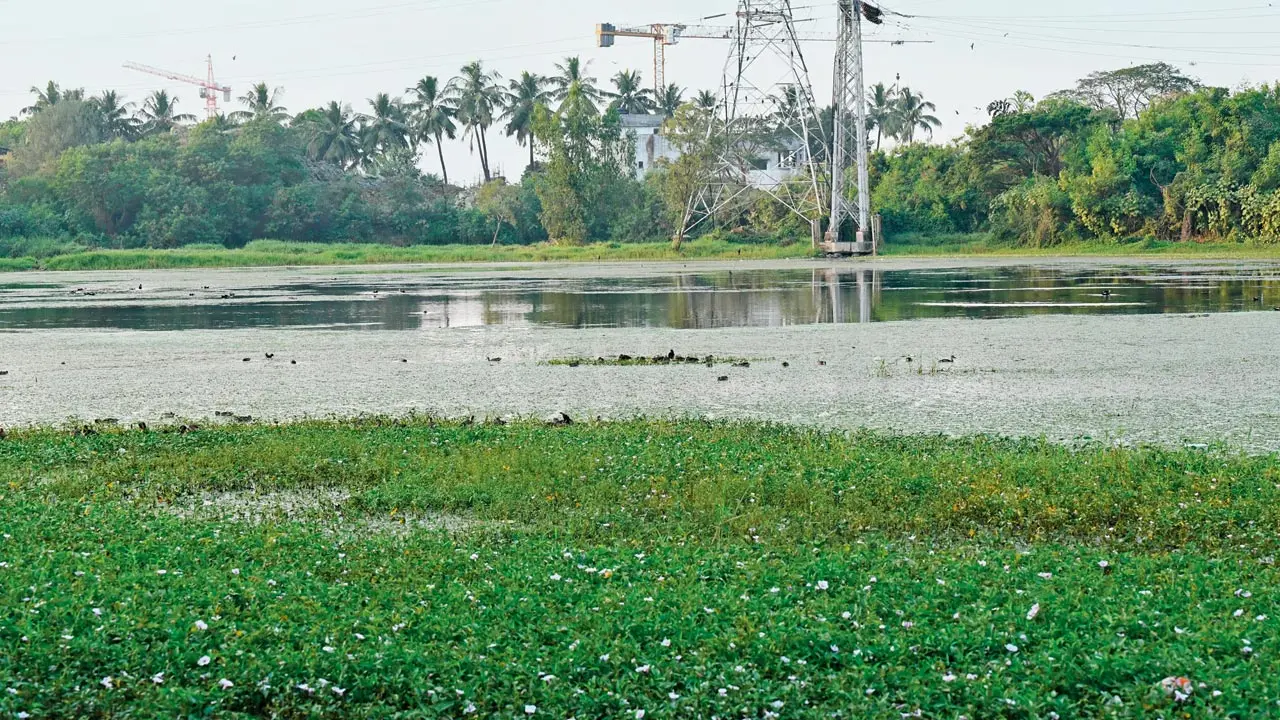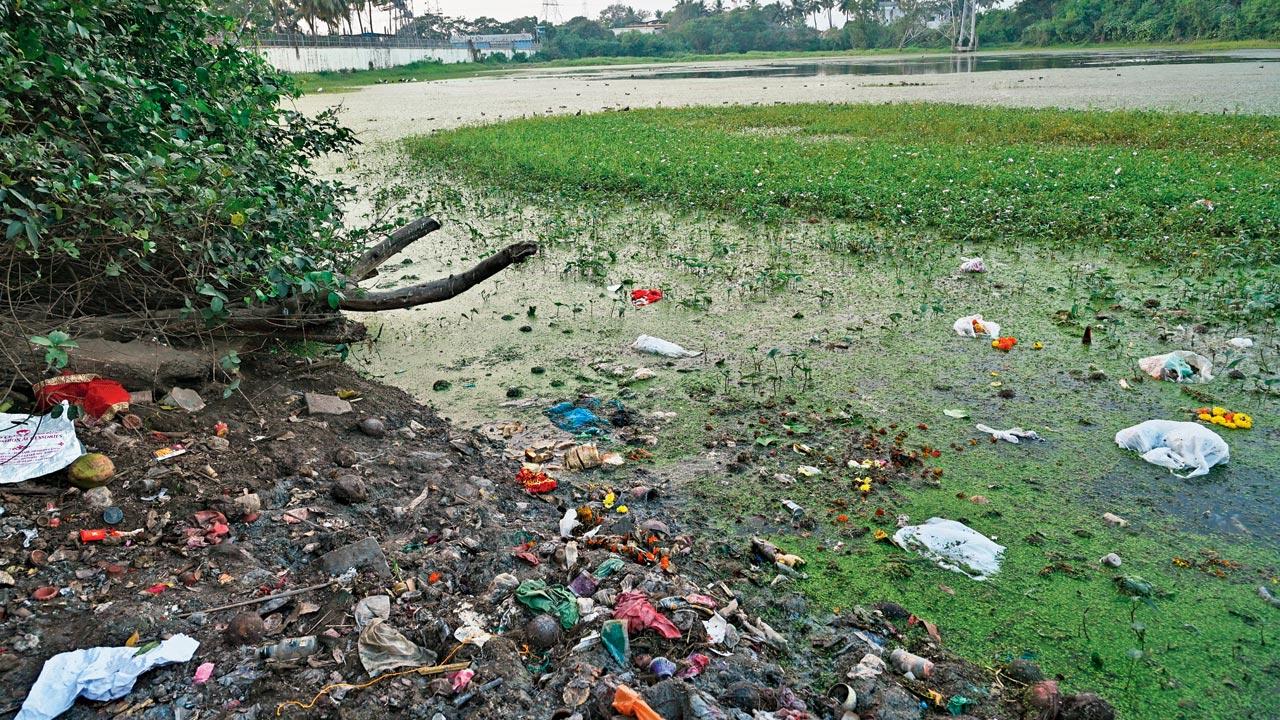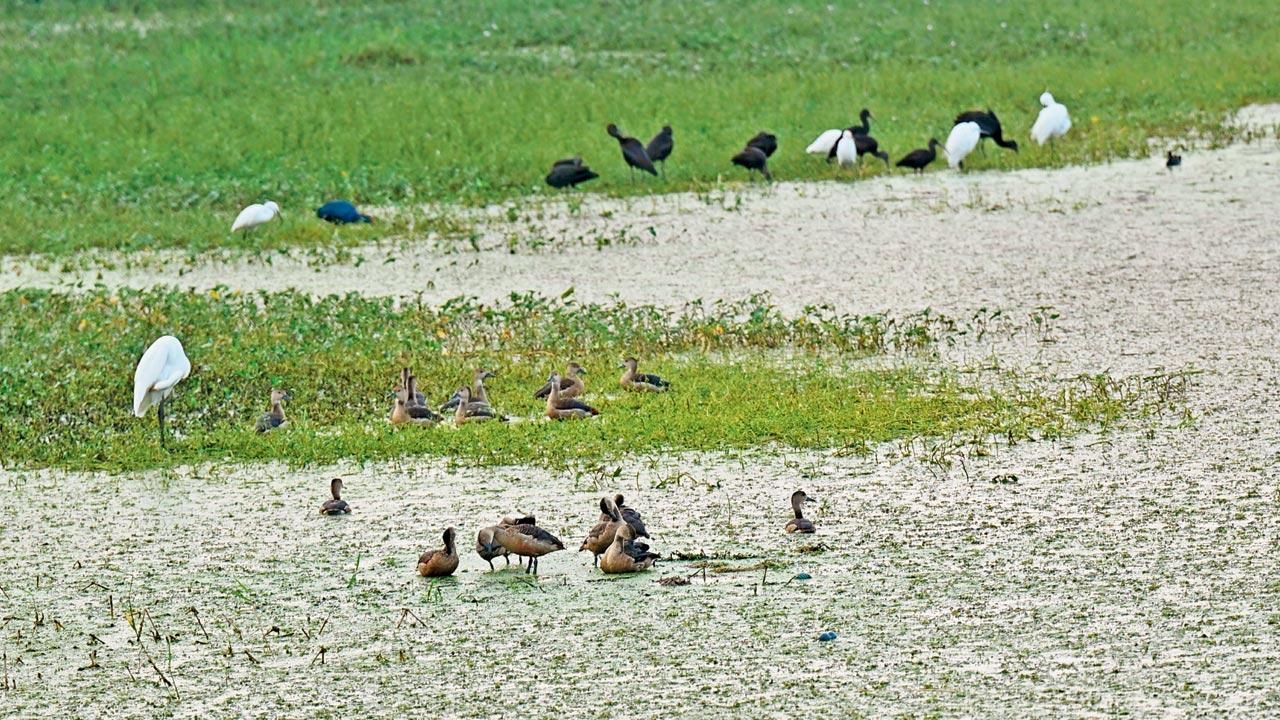Conservationists, activists and locals say MHADA’s cleaning process must keep in mind the 100-plus bird species around lake. The clean-up work officially started on May 16 in the presence of MLA Haroon Khan, who issued a no-objection certificate to MHADA for the project.

Conservationists argue that wetland recognition will allow for controlled vegetation removal, better protection. Pic/Satej Shinde
MHADA has begun cleaning Lokhandwala Lake — an urban birding haven in Andheri West and a favourite among migratory birds — but wildlife experts and conservationists stress that the process must be conducted scientifically to preserve its fragile ecosystem.
The clean-up work officially started on May 16 in the presence of MLA Haroon Khan, who issued a no-objection certificate to MHADA for
the project.
mid-day has been consistently highlighting the ecological value of Lokhandwala Lake. In February this year, we reported that over 100 bird species, including migratory ones, rely on the lake, which still awaits formal wetland status. The invasive aquatic plant Ipomoea has been spreading across the lake, choking open water zones and threatening biodiversity. Conservationists argue that wetland recognition would allow for controlled vegetation removal and better protection.

Environmentalists and local residents, including members of the Lokhandwala Oshiwara Citizens Association (LOCA), have long been demanding that Lokhandwala Lake be declared a wetland. In June 2022, then Environment Minister Aaditya Thackeray had instructed the Mangrove Cell to declare it a forest area to ensure its protection.
“For over 25 years, residents have been fighting to protect the lake. But over time, construction debris and garbage have been dumped in and around it,” said a local activist. Following a series of mid-day articles, the State Human Rights Commission also took suo motu cognisance and directed authorities to take action.
Dhaval Shah, president of LOCA, said, “It’s good to see the clean-up finally begin after years of follow-up. We hope the work is done in a scientific manner to preserve the lake’s biodiversity.”
 Conservationists argue that wetland recognition would allow for better protection of Lokhandwala Lake. File pics/Satej Shinde
Conservationists argue that wetland recognition would allow for better protection of Lokhandwala Lake. File pics/Satej Shinde
Naturalist and writer Sunjoy Monga said, “The cleaning must not involve random dredging. Authorities should remove every bit of garbage — plastic, bottles, cans, religious waste, mattresses, thermocol — but avoid disturbing nutrient-rich silt and aquatic plants. Security monitoring with three to four cameras and daytime guards is essential to prevent further dumping. Without that, we’ll be back to square one.”
Chartered accountant and wildlife filmmaker Sumesh Ashok Lekhi added that a holistic approach is needed to protect everything from “bacteria to birds.” He cautioned against desilting, explaining that the lakebed has stabilised and supports biodiversity. “Aquatic plants and shallow areas are vital feeding and breeding zones for birds, amphibians, fish, and crustaceans. Resources should be used to maintain the lake’s natural habitat, not to turn it into a tourist spot,” he said.
Lekhi recommended regular cleaning of entrances and discouraging feeding of fish and birds with bread or processed food, which creates a heavy bio-load and algae blooms. “Work involving physical entry into the lake must only be done once bird chicks have grown, and nesting sites are at least 40 to 50 metres away. The lake is a natural jewel — it doesn’t need major funds or beautification, just regular care.”
Shiv Sena (UBT) MLA from Versova, Haroon Khan, said: “Lokhandwala Lake is an important area where over 150 species of birds — including migratory ones — are spotted. That’s why we’ve decided to carry out the lake’s clean-up with the help of MHADA. All the garbage and plastic dumped along the sides of the lake will be removed, and MHADA has been instructed to carry out the work in a scientific manner to ensure no harm is caused to the lake or its biodiversity. We will also ensure that a system is put in place to prevent future dumping or damage to Lokhandwala Lake, which is truly a birding paradise.”
25 years
Approximate time locals have been fighting to protect lake
Locals say
Karan Jotwani, Lokhandwala resident
“Lokhandwala Lake is infested with invasive plants that are threatening its natural functioning. The clean-up is long overdue, and we’re hopeful that this effort will rejuvenate the lake.”
Parag Motani, Another resident
“Right now, household waste, idol dumping, and other trash are severely affecting the wildlife that depends on the lake. Cleaning is absolutely essential, and we’re thankful to LOCA and MLA Haroon Khan for taking this up.”
Birds commonly spotted at Lokhandwala Lake
Purple swamphen, garganey duck, coppersmith barbet, white-throated kingfisher, black kite, rose-ringed parakeet, spot-billed duck, Indian pond heron, black drongo, common myna, cattle egret, and red-vented bulbul.
 Subscribe today by clicking the link and stay updated with the latest news!" Click here!
Subscribe today by clicking the link and stay updated with the latest news!" Click here!








